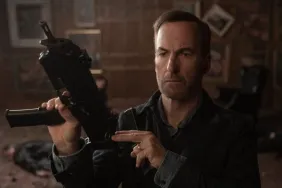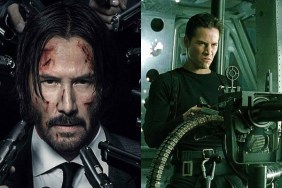John Goodman, beloved character actor, TV star and blue furry Pixar monster, has been a mainstay with audiences for decades. From brief early roles in Revenge of the Nerds and C.H.U.D. to prolific collaborations with The Coen Brothers and Disney, Goodman’s alternatively soft and powerful demeanor, off-the-cuff sense of humor and dramatic gravitas regularly earns him the respect of his peers and audiences alike.
But with the mysterious 10 Cloverfield Lane opening this week, trapping John Goodman in a bunker under unknown circumstances, we got to wondering: he’s made a lot of great movies, but what’s the best John Goodman movie ever?
Also: All of the Coen Brothers Movies | Ranked
As always, the rules are simple. Our panel of film critics (Crave’s William Bibbiani and Witney Seibold, Collider’s Brian Formo) are only allowed to pick one film to defend as John Goodman’s finest hour. This time they each rallied around films by The Coen Brothers, but they couldn’t narrow it down to a single film. They’re going head to head… Goodman-style.
Find out what they picked and why, and come back every Wednesday for another highly debatable installment of Crave’s The Best Movie Ever!
Brian Formo’s Pick: Barton Fink (1991)

20th Century Fox
Of modern supporting actors, John Goodman is perhaps the most egregiously overlooked (in regards to racking up acting nominations). Goodman is a reliable actor, but also unlike any other in the modern era. He possesses a gravelly, seen-the-world voice; but that world has done many things to him. In some instances it’s beaten him down, the cruel winds have sent him to jail, to a bad sandwich in Seattle, or all the way to Vietnam or even Hell. But Goodman’s characters often are the toughest sons of bitches. At some point people go “over the line” with Goodman and they often lose.
In terms of both loss and being overlooked, Goodman’s performance in Barton Fink is perhaps his most heartbreaking because it perhaps reflects how Hollywood tends to look at him: as the handy Midwestern everyman. Goodman’s Charlie Meadows is the always smiling, yet lonesome traveling salesman who finds himself in the same hotel as a Broadway playwright named Barton Fink (John Turturro). Fink has moved to Los Angeles to churn out quick, digestible garbage screenplays, but he fancies telling stories about the common man. Meadows tells Fink that he’s got all kinds of stories in that regard, but Fink always shuts him down. He’s committed to telling the story of the common man, not in listening to the common man. And Meadows lets it slide off his common back.
You feel for Charlie Meadows because he’s so kind. He asks questions and he waits for his turn to speak. He has a wide smile. But people don’t listen to him unless they get to talk about themselves. A lot of people have talked at Goodman as an actor. And Goodman has enhanced some great performances, but his own magnificence has been far too often overlooked as well. God bless the Coen brothers for being so giving to a modern (overlooked) great.
William Bibbiani’s Pick: The Big Lebowski (1998)

Gramercy Pictures
John Goodman’s greatest performance will probably always be in the television series Roseanne, where he made working class attitudes, humor and physicality seem more attractive than ever before. But in movies his fury is a huge part of his identity. Even in Monsters Inc. the cuddly monster he plays is a master “scarer.” The masterful acting of John Goodman can infect even the most terrifying of creatures with vulnerability. And never was the balance more exquisite than in The Big Lebowski.
Goodman plays Walter Sobchak, a dangerously violent bowler who ill-advised self-confidence nearly causes one disaster over another. One toe over the line, BAM! Walter’s got a gun in your face, and thanks in part to The Coen Brothers’ skillful writing and in majority to Goodman’s performance… we like this guy.
We like Walter Sobchak. Think for a moment about how mad that is. If Walter were a part of any of our lives we would have a restraining order against him, but instead he’s become a pop culture teddy bear. We know he means well. Goodman reveals the humane rationale for Walter’s righteous anger in speeches about his ex-wife and his pitiful attempts to wipe human ashes off of his best friend’s face. While in reality the means wouldn’t justify his ends, in The Big Lebowski we love him for trying.
Witney Seibold’s Pick: The Big Lebowski (1998)

Gramercy Pictures
Given the size and passion of the cult surrounding it, it’s difficult to imagine the time – 1998 until late 1999 – when The Coen Bros. The Big Lebowski didn’t dominate cult film discourse. The film has, in the ensuing years, become a staple of midnight movie programming, and is one of the more heavily-quoted feature films to have come out since, gosh, The Princess Bride a decade earlier. It passionate following likely comes from its perhaps-misread slacker philosophy. Relax, abide, and the world will take care of itself. In fact, The Big Lebowski is a satirical look at the ultra-masculine trappings of film noir. What would happen if Sam Spade were not a hard boiled mug, but a burnt-out aging hippie whose only passions are marijuana and bowling? Comedy.
The exemplar of that masculinity in The Big Lebowski is John Goodman’s character, Walter Sobchak. Walter is a noisy, self-important gun-toting blowhard with delusions of grandeur and just enough intelligence to sound smart, but has only anger and arrogance to back it up. Everyone knows someone exactly like Walter, frustrated by his confidence, angered by his backward worldview, and annoyed by his immature refusal to grow up and move on. He is the awful uncle who brings up politics at the Thanksgiving table. Walter lives in a world where the Vietnam war is the only historical event, and, perhaps more quietly pathetic, where his stalled marriage is still hanging on.
Walter is so comprehensively embodied by Goodman, you would be forgiven for assuming Goodman is that way in real life. Goodman didn’t just play a part, but seems to have invented a strangely persistent cinematic icon. He’s funny, aggravating, and convincingly real. In an impressive career full of amazing performances, Goodman never stood taller than when playing this asshole. He’s not wrong. He’s just as asshole.
Previously on The Best Movie Ever:
Top Photo: Gramercy Pictures / 20th Century Fox
The Best Movie Ever
-
The Best Movie Ever | Under the Sea

Is the best movie ever set underwater a family film about a fish or a World War II movie about a German submarine?
Photos: Disney / Pixar / Neue Constantin Film
-
The Best Movie Ever | Video Game Adaptations

There aren't a lot of good video game adaptations, and our critics just can't agree on which one is the best.
Photos: Universal Pictures / New Line Cinema / Dimension Films
-
The Best Movie Ever | Reptiles

Movies about slithery things aren't very common, so our critics are presenting their picks for the best reptile movies ever.
Photo: Warner Bros. / Paramount Pictures / New Line Cinema
-
The Best Movie Ever | Helena Bonham Carter

Is Helena Bonham Carter's best movie a classy costume drama or a twisted critique of contemporary masculinity?
Photo: Fine Line Features / Miramax Films / 20th Century Fox
-
The Best Movie Ever | Crime Comedies

What's the best comedy ever made about living a life of crime? Our critics present their picks.
Photo: MGM / Warner Bros. / Janus Films
-
The Best Movie Ever | Jodie Foster

The Oscar-winning actor/director is one of the most respected artists in the film industry. But what's her best movie ever?
Photo: Columbia Pictures / Warner Bros. / MGM Home Entertainment
-
The Best Movie Ever | Robert Downey Jr.

The man who would be Iron Man has had one of the most unusual careers in film history, but which movie is his best?
Photo: Warner Bros. Pictures / Paramount Pictures
-
The Best Movie Ever | Cats

Keanu may be a great comedy about a cat, but what's the best cat movie ever? Our critics picked some WEIRD films this week!
Photo: Drafthouse Films / United Artists / Kindai Eiga Kyokai
-
The Best Movie Ever | Charlize Theron

Is Charlize Theron's best movie the one that earned her an Oscar, or the one that kicked ass?
Photo: Warner Bros. / Newmarket Films
-
The Best Movie Ever | Ice Cube

It's been 25 years since Ice Cube made his acting debut. So what's his best movie ever?
Photo: Miramax Films / New Line Cinema / Universal Pictures
-
The Best Movie Ever | Dreams

What's the best movie ever made about dreams, dreaming or dreaminess? Our critics present their picks.
Photo: Films du Losange / Criterion / Fox Searchlight
-
The Best Movie Ever | Batman

Everybody loves Batman, but what's the best Batman movie ever? Our critics can't agree in this week's roundup.
Photo: 20th Century Fox / Warner Bros.
-
The Best Movie Ever | Superman

Batman v Superman isn't the best Superman movie ever, so we asked our stable of critics to decide which one is.
Photo: Warner Bros.
-
The Best Movie Ever | Justice

Let's celebrate this exciting new Dawn of Justice with a spirited debate about the best movie ever made about justice itself.
Photo: Koch-Lorber / 20th Century Fox / United Artists
-
The Best Movie Ever | John Goodman

The star of 10 Cloverfield Lane has had an astounding career, but what's his best movie ever?
Photo: Gramercy Pictures / 20th Century Fox
-
The Best Movie Ever | Die Hard Ripoffs

Die Hard spawned a whole genre of action movies that live on to this day, but which Die Hard ripoff is the best?
Photo: 20th Century Fox / Columbia Pictures / Golden Princess Film Production
-
The Best Movie Ever | Oscar Bait

'Oscar bait' isn't an insult, it's a genre. So what's the best Oscar bait movie ever?
Photo: The Weinstein Company / Universal Pictures
-
The Best Movie Ever | Witchcraft

What's the most bewitching movie ever made about witches? Our panel of critics narrows it down to two classic films.
Photo: Criterion / American International
-
The Best Movie Ever | Action Comedies

If Deadpool isn't the best action comedy ever, what is? Our panel of film critics make the case for their favorites.
Top Photo: Warner Bros. / RM Films International / 20th Century Fox
-
The Best Movie Ever | George Clooney

Everyone loves George Clooney, but none of our critics can agree on which film qualifies as his very best.
Photo: Buena Vista / Universal / Warner Bros.
-
The Best Movie Ever | Martial Arts

Our panel of critics fights over their picks for the best martial arts movie ever made. There can be only one!
Top Photo: Shaw Bros. / Warner Bros. / Toho
-
The Best Movie Ever | Creepy Dolls

Everyone's frightened of little toy people, but what's the creepiest creepy doll movie ever?
Top Photo: Universal Pictures / United Artists / New World Pictures
-
The Best Movie Ever | Modern Warfare

If 13 Hours isn't the best movie about our contemporary wars, what is? Our panel of critics weighs in.
Photo: Warner Bros./Columbia Pictures/Summit Entertainment
-
The Best Movie Ever | Revenge

If The Revenant isn't the greatest revenge movie, what is? Our film critics nominate some of the best films ever made.
Top Photos: Janus Films / Paramount Pictures / Tartan Films
-
The Best Movie Ever | Parties

We asked our critics to pick the best party movie ever made, and none of them picked a film about a frat house.
Photo: Warner Bros. / 20th Century Fox / Sony Pictures Classics
-
The Best Movie Ever | Quentin Tarantino

Is the Hateful Eight director's best film an autumnal romance or a World War II drama? Our critics can't decide.
Photos: The Weinstein Company / Miramax
-
The Best Movie Ever | Star Wars

Is A New Hope better than The Empire Strikes Back? Our critics debate the classics (and ignore the rest).
Photos: Disney / LucasFilm
-
The Best Movie Ever | Ron Howard

He's directed films in nearly every genre and won an Oscar for his troubles, but what's the best Ron Howard movie ever?
Photo: Touchstone / Universal / MGM
-
The Best Movie Ever | William Shakespeare

He's the most adapted author in movie history, but which William Shakespeare movie is the very best?
Photo: Top Photos: Toho / Paramount / Columbia
-
The Best Movie Ever | Pixar

Everyone has their favorite Pixar movie, but which one is the best?
Photo: Disney
-
The Best Movie Ever | Young Adult

Before you say goodbye to The Hunger Games, find out what our critics think was the best young adult movie ever.
Photo: Universal Pictures / Warner Bros.
-
The Best Movie Ever | Angelina Jolie

She's been acting for decades, directing for years, and winning our admiration forever. But what is Angelina Jolie's best film ever?
Photo: The Samuel Goldwyn Company / HBO / Columbia Pictures
-
The Best Movie Ever | James Bond

It's new school versus old school! Our critics debate which film qualifies as the best Bond movie ever.
Photo: MGM / Colombia Pictures / United Artists
-
The Best Movie Ever | Sandra Bullock

Our critics can only agree on one thing: the best Sandra Bullock movie isn't the one that got her an Oscar.
Photo: 20th Century Fox / Warner Bros.






